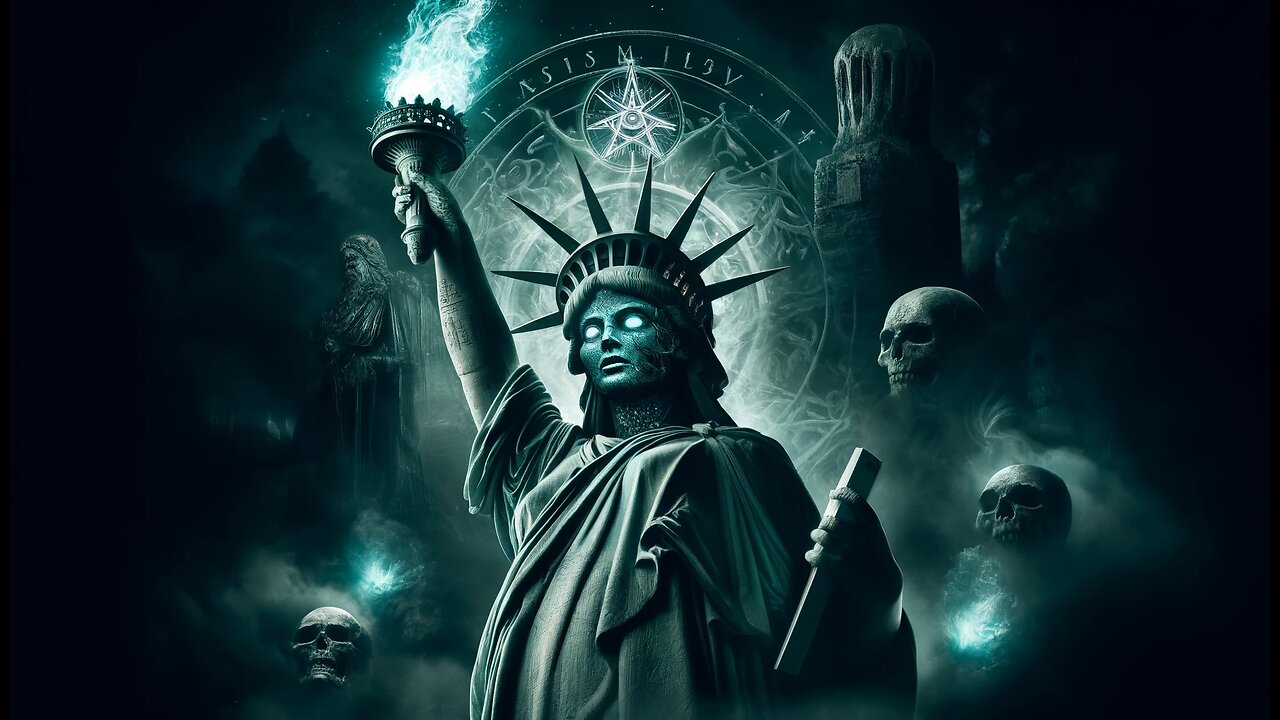Premium Only Content

Secrets of the Statue of Liberty: Hecate’s Dark Influence
Secrets of the Statue of Liberty: Hecate’s Dark Influence
Could the iconic Statue of Liberty be more than just a symbol of freedom and democracy? What if, beneath her serene exterior, she harbors the essence of an ancient goddess—Hecate?
The Statue of Liberty was conceived as a gift from France to the United States, symbolizing liberty and democracy. Designed by sculptor Frédéric Auguste Bartholdi and engineered by Gustave Eiffel, her construction began in 1875 and was completed in 1886. But what if the inspiration behind her design was influenced by more than just contemporary ideals?
Born in 1834 in Colmar, France, Frédéric Auguste Bartholdi initially trained as an architect before focusing on painting and sculpture. Bartholdi was deeply influenced by his travels and the monumental art he encountered. In 1875, Bartholdi joined the Freemasons, specifically the Lodge Alsace-Lorraine in Paris. The Freemasons, known for their secretive nature and intricate rituals, have often been linked to various occult traditions and symbols.
Both the Statue of Liberty and Hecate share a profound symbolism of light. The torch held by Lady Liberty is not just a beacon of hope but a guiding light towards enlightenment and freedom. However, Hecate's torches illuminate a different path. As a goddess associated with witchcraft and necromancy, her light is often linked to the occult and the supernatural, guiding souls through the darkness of the underworld.
The Statue of Liberty stands as a welcoming figure for immigrants arriving in America, symbolizing a new beginning and the promise of freedom. Hecate, revered as the goddess of crossroads, serves as a guide during times of transition, often in the shadowy realms between life and death. Her role as a guide is not one of comfort, but of navigating the unknown and the feared.
Gustave Eiffel, renowned for his work on the Eiffel Tower, also played a crucial role in the construction of the Statue of Liberty. Eiffel designed the iron framework that supports the statue’s copper skin, ensuring its stability and durability. Although direct evidence linking Eiffel to the occult or secret societies like the Freemasons is less pronounced than with Bartholdi, the era's fascination with science, progress, and esoteric knowledge often intertwined.
Standing at the gateway to New York Harbor, the Statue of Liberty serves as a guardian of America's threshold. In ancient times, Hecate was worshipped at doorways and thresholds, believed to ward off evil spirits and offer protection. However, her protection came at a price, often involving dark rituals and offerings. Hecate's association with thresholds extends to the boundaries of the mortal and immortal realms, where she was both revered and feared.
Hecate's cult was shrouded in mystery and darkness. Her worship often involved rituals at night, invoking her powers through sacrifices and offerings. Known as a goddess of witchcraft, Hecate's followers practiced necromancy, seeking to communicate with the dead. Her influence extended into the realm of the occult, where her name evoked both reverence and dread.
Emma Lazarus, born in 1849 to a wealthy Sephardic Jewish family, was a poet, essayist, and activist deeply engaged in issues of her time, particularly concerning Jewish identity and the plight of immigrants. Her famous sonnet, "The New Colossus," written in 1883 to help raise funds for the statue's pedestal, casts the statue as the "Mother of Exiles," welcoming the "tired," "poor," and "huddled masses."
Analyzing the inscription from an occult perspective reveals potential hidden motives. The torch, symbolizing enlightenment, can also be seen as Lucifer’s light, shedding knowledge while keeping the masses in darkness. Lazarus’s phrase "wretched refuse" has been critiqued for its condescending undertones, suggesting a more cynical view of immigration where the statue’s promise of refuge masks the harsh realities and challenges faced by immigrants.
The theme of child and human sacrifice is prevalent in the history of various goddess cults. Hecate, often linked with witchcraft and necromancy, was sometimes associated with human sacrifices at crossroads to gain her favor. Similarly, other deities like Moloch demanded child sacrifices, and Inanna/Ishtar's intense rituals hinted at blood offerings. These dark practices reflect the perceived need to appease powerful deities through ultimate acts of control and submission.
The late 19th century in America was significantly impacted by the Civil War, which resulted in an estimated 620,000 to 750,000 deaths, predominantly among the male population. This loss created demographic imbalances and necessitated changes in societal roles. Many women were left as widows and children as orphans, leading to shifts in family structures and greater participation of women in the workforce and public life. The reduction in the male workforce led to increased employment opportunities for women and immigrants.
The late 19th century also saw a resurgence of interest in the occult and esoteric traditions. Spiritualism, popular among women, involved communication with the dead and became a form of social and spiritual rebellion. The Theosophical Society, founded in 1875, explored mystical knowledge and attracted many followers interested in blending Eastern and Western spiritual traditions.
Hecate, an ancient goddess associated with witchcraft, crossroads, and the underworld, became a potent symbol for various occult practices. Feminism and occultism both emphasized personal empowerment and breaking free from traditional societal constraints. Adopting symbols and rituals from goddess cults like Hecate provided a form of symbolic rebellion against patriarchal structures.
While the Statue of Liberty symbolizes enlightenment and freedom, the connections to Hecate and the potential occult symbolism reveal a more complex and shadowy narrative. This duality invites us to reconsider the deeper meanings and hidden histories behind these iconic figures. Could Lady Liberty be the modern incarnation of Hecate? Perhaps, in exploring this darker possibility, we uncover new layers of meaning within these timeless icons.
Sources:
- Frédéric Auguste Bartholdi - Wikipedia (https://en.wikipedia.org/wiki/Frédéric_Auguste_Bartholdi)
- Frederic-Auguste Bartholdi | Biography, Art, & Facts | Britannica (https://www.britannica.com/biography/Frederic-Auguste-Bartholdi)
- Exposing the Gematrix (https://exposingthegematrix.blogspot.com)
- 4 Astounding Statue of Liberty Conspiracies (https://american-history.net/statue-of-liberty-conspiracies)
- Lucifer – Occult Symbolism of the Statue of Liberty (https://lucysfur.wordpress.com/2021/05/12/lucifer-occult-symbolism-of-the-statue-of-liberty)
- The Symbolic Meaning of ISIS And The Statue of Liberty (https://stillnessinthestorm.com/2021/05/the-symbolic-meaning-of-isis-and-the-statue-of-liberty)
- The Statue of Liberty is a deeply sinister icon (https://www.spectator.co.uk/article/the-statue-of-liberty-is-a-deeply-sinister-icon)
- Emma Lazarus - Wikipedia (https://en.wikipedia.org/wiki/Emma_Lazarus)
- Emma Lazarus: “The New Colossus” by Austin Allen | Poetry Foundation (https://www.poetryfoundation.org/articles/144409/emma-lazarus-the-new-colossus)
- Emma Lazarus: The Jewish Poet Of The Statue Of Liberty (https://allthatsinteresting.com/emma-lazarus)
- Emma Lazarus | Jewish Women's Archive (https://jwa.org/encyclopedia/article/lazarus-emma)
- Spiritualism and the Occult (https://www.smithsonianmag.com/history/civil-war-spiritualism-belief-and-the-supernatural-180970881/)
- Theosophical Society - Wikipedia (https://en.wikipedia.org/wiki/Theosophical_Society)
- Impact of the Civil War (https://www.history.com/topics/american-civil-war/american-civil-war-history)
-
 5:44
5:44
Dangerous reads
1 year agoThe Mystical Cinematic World of Andrei Tarkovsky and Rudolf Steiner's Anthroposophy, Part One
1991 -
![Breaking News: Ghislaine Maxwell READY TO TALK About Epstein Clients List [EP4631-8AM]](https://1a-1791.com/video/fww1/b5/s8/1/8/Y/2/1/8Y21y.0kob-small-Breaking-Ghislaine-Maxwell-.jpg) LIVE
LIVE
The Pete Santilli Show
15 hours agoBreaking News: Ghislaine Maxwell READY TO TALK About Epstein Clients List [EP4631-8AM]
1,657 watching -
 10:18
10:18
BlackBeltBarrister
1 hour agoTwo Tier Clear as Day?
131 -
 58:38
58:38
MTNTOUGH Podcast w/ Dustin Diefenderfer
7 hours agoSteve Decker: Conserve Habitat, Empower Hunters | MTNPOD #124
139 -
 0:47
0:47
WildCreatures
3 days agoGopher hits the snooze button and goes back to sleep in the sunshine
7212 -
 16:52
16:52
Chris From The 740
10 hours agoBest Budget Green Dot with DPP Footprint? Meet the Gideon Storm!
841 -
 22:39
22:39
Forrest Galante
11 hours agoPrivate Tour of Australia's Craziest Zoo
32.3K11 -
 13:10
13:10
Side Scrollers Podcast
1 day agoGen Z Tries Super Mario Bros 2 for the First Time
38.3K11 -
 1:06:42
1:06:42
The Connect: With Johnny Mitchell
2 days ago $16.36 earnedTruth About The Epstein Files: CIA Agent Reveals The Connection Between The Mossad, Epstein, & Trump
40.6K33 -
 LIVE
LIVE
FyrBorne
13 hours ago🔴Warzone M&K Sniping: I Have An Eye for Destruction
104 watching